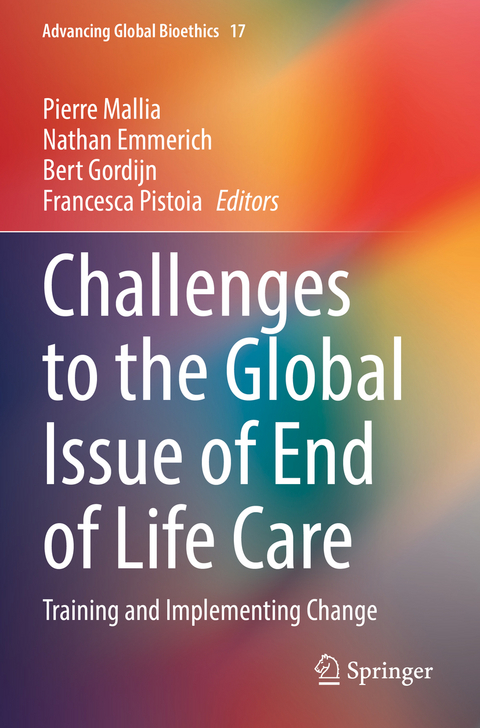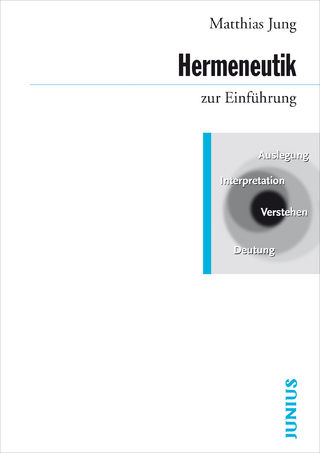
Challenges to the Global Issue of End of Life Care
Springer International Publishing (Verlag)
978-3-030-86388-3 (ISBN)
This book addresses the problems faced by people and hospitals dedicated to providing optimal end-of-life care and asks whether ethicists can function as experts on this subject. Though ethics consultation is a growing practice in medical contexts, difficult questions surrounding the role of ethicists in professional decision-making remain. The chapters in this book examine the nature and plausibility of moral expertise, the relationship between character and expertise, the nature and limits of moral authority, the question of how one might become a moral expert, and the trustworthiness of moral testimony. This volume not only engages with the growing literature in the debate on end-of-life care but also offers new perspectives from both academics and practitioners. Such perspectives include ways on how to get together to optimize end-of-life care. This book is of particular interest to bioethicists, clinicians, ethics committees, students of social epistemology, patient groups, and institutions, especially religious, who may not be sufficiently imparting the social teachings of end-of-life care. It also shows how they are indeed stakeholders for what is today called 'a good death'. These new essays advance discussions and provide practical information on dying as well as acting as a guide to those interested in actively effecting change.
lt;b>Pierre Mallia is Professor of Family Medicine and Patients' Rights in the Faculty of Medicine & Surgery at the Medical School, Mater Dei Hospital, where he also coordinates the Bioethics Research Programme. He is Consultant in Clinical Ethics at Malta's main hospital 'Materi Dei'. He is Chairperson and founder of the Medicine & Law Programme of the Faculty of Laws within the same university and a Visiting Professor at the Laennec University of Lyon, France. He is Chairman of the Health Ethics Committee of the Department of Health and recently has been made Chairperson of the National Bioethics Consultative Committee of the Ministry of Health, where he has been advisor to the several consecutive Ministers. He has recently been also appointed Chairman of the Faculty Research Ethics Committee (FREC) of the Faculty of Medicine & Surgery at the University of Malta. At the moment he is the Principal Investigator and holder of the Erasmus + EndCare project, which is studying issues and problems of applying pathways at the end of life. He represents the University of Malta as the Principal partner, along with two other partner countries (Italy and Ireland) and experts from the UK, Ireland, France, Iran, Toronto, USA, and the Pontifical Academy for Life of the Vatican. He is planning a second project which will involve Patient Groups and Palliative Care organisations. He has published over eighty articles in international peer reviewed journals and also several books including on by Sringer-Nature, on The Nature of the Doctor Patient Relationship. He has contributed Chapters to Springer's Encylopedia of Global Ethics (3 Vols), and to, Springer's Handbook for global ethics (4 Vols), Edited by Professors Henk Ten Have and Bert Gordijn.
Nathan Emmerich is a Senior Lecturer in Bioethics at the Australian National University. Based in the Medical School he is the lead for Professionalism and Leadership in Phase one of the M.Ch.D. Previously he has been a postdoctoral research in the Institute of Ethics at Dublin City University, and a Visting Research Fellow at Queen's University Belfast. Whilst at DUC he was part of a project on ethics and end of life care and his recent publications have focused on this area. More generally, his research falls under the broad rubric of Bioethics. His background is in philosophy and 'applied ethics', his interests are interdisciplinary.
Bert Gordijn is Professor and Director of the Institute of Ethics at Dublin City University in Ireland. He has studied Philosophy and History in Utrecht, Strasbourg and Freiburg in Breisgau. In 1995 he was awarded a doctorate in Philosophy from the Albert-Ludwigs-Universität Freiburg, followed by a doctorate in Bioethics from the Radboud University Nijmegen in 2003. Bert has been a Visiting Professor at Lancaster University (UK), Georgetown University (USA), the National University of Singapore, the Fondation Brocher (Switzerland), and Yenepoya University (Mangalore, Karnataka, India). He has served on Advisory Panels and Expert Committees of the European Chemical Industry Council, the European Patent Organisation, the Irish Department of Health and UNESCO. Bert is Editor-in-Chief of two book series: The International Library of Ethics, Law and Technology and Advances in Global Bioethics as well as a peer reviewed journal: Medicine, Health Care and Philosophy, all published by Springer Nature. He is Secretary of the European Society for Philosophy of Medicine and Healthcare and President of the International Association of Education in Ethics.
Dr. Francesca Pistoia completed her degree summa cum laude in medicine and surgery, and thereafter specialized in neurology summa cum laude, at the University of L'Aquila. She earned a PhD in Internal Medicine and Applied Immunology at the same University. Currently she holds the position of Assistant Professor of Ne
SECTION I Ethical and Social issues.- Chapter 1 INTRODUCTION: HARMONISING END OF LIFE CARE - A GLOBAL PUBLIC HEALTH ISSUE.- Chapter 2 The Liverpool Care Pathway: lessons in care of the dying.- Chapter 3 Spirituality, Religion, and Psychology.- Chapter 4 Global systems: Palliative care and hospices at the end of life.- Chapter 5 What makes a good death? Acknowledging the global cultural and social issues.- SECTION II Professional Issues.- Chapter 6 Medical decision-making at the end of life.- Chapter 7 General Practice and care at the end of life: how family practice changes according to country.- Chapter 8 Team Approaches - how they can be made to work.- Chapter 9 Communication and conflict resolution - managing conversations. A culturally sensitive model.- SECTION III Medico-legal Proposals.- Chapter 10 Advance Care Planning.- Chapter 11 Importance of Palliative Care training in all medical curricula.- Chapter 12 Palliative Sedation - is it a real dilemma?.- SECTION IV Implementing-Change pathways.- Chapter 13 Engaging patient groups in end-of-life.- Chapter 14 Developing Pathways towards Improving End of Life care and Advanced Planning.- Chapter 15 Pierre Mallia, Nathan Emmerich, Bert Gordijn, Francesca Pistoia.- APPENDIX A Curriculum for the Harmonisation of End of Life Care within micro or macro systems EndCare, ERASMUS+ project.
| Erscheinungsdatum | 22.02.2023 |
|---|---|
| Reihe/Serie | Advancing Global Bioethics |
| Zusatzinfo | XVIII, 241 p. 1 illus. |
| Verlagsort | Cham |
| Sprache | englisch |
| Maße | 155 x 235 mm |
| Gewicht | 480 g |
| Themenwelt | Geisteswissenschaften ► Philosophie ► Allgemeines / Lexika |
| Geisteswissenschaften ► Philosophie ► Ethik | |
| Medizin / Pharmazie ► Medizinische Fachgebiete ► Palliativmedizin | |
| Schlagworte | cultural and social issues of end of life care • end of life care • end of life challenges • ethics of family medicine • global health in the dying process • harmonsing end of life care • legal gaps in end of life • medical decision-making • refusal of treatment • what is a good death? |
| ISBN-10 | 3-030-86388-3 / 3030863883 |
| ISBN-13 | 978-3-030-86388-3 / 9783030863883 |
| Zustand | Neuware |
| Informationen gemäß Produktsicherheitsverordnung (GPSR) | |
| Haben Sie eine Frage zum Produkt? |
aus dem Bereich


